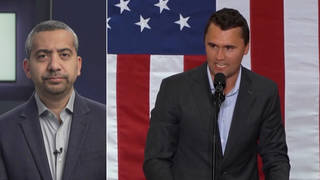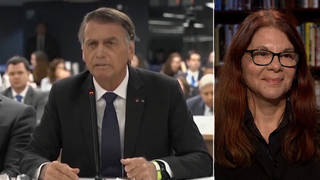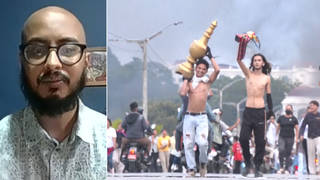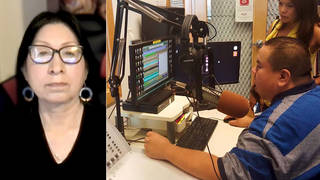
Topics
On Indigenous Peoples’ Day, we remember the Indigenous actress and activist Sacheen Littlefeather, who died last week at the age of 75, not long after she received an apology 50 years after she spoke at the Oscars in protest of Hollywood’s portrayal of Native Americans. In 1973, she accepted an Oscar on behalf of Marlon Brando, who boycotted the ceremony, only to face boos from the crowd, threats of physical violence from the actor John Wayne and mocking by Clint Eastwood. The speech derailed her acting career, but she never stopped speaking out. “It was critical for the psyche of all our relations to bring awareness to and interrupt the negative interpretation and representation of Native American people by the film television and sports industries,” said Littlefeather, reflecting on her speech at the Oscars in September, just three weeks before her death.
Transcript
AMY GOODMAN: On this Indigenous Peoples’ Day, we spend the rest of the hour remembering Sacheen Littlefeather. She recently died at the age of 75. In 1973, she took the stage at the Oscars on behalf of Marlon Brando, who boycotted the ceremony to protest Hollywood’s portrayal of Native Americans. Some members of the audience booed and mocked Littlefeather as she addressed the awards ceremony wearing traditional Apache clothing.
LIV ULLMANN: The winner is Marlon Brando in The Godfather.
ANNOUNCER: Accepting the award for Marlon Brando and The Godfather, Ms. Sacheen Littlefeather.
SACHEEN LITTLEFEATHER: Hello. My name is Sacheen Littlefeather. I am Apache, and I am president of the National Native American Affirmative Image Committee. I’m representing Marlon Brando this evening, and he has asked me to tell you, in a very long speech which I cannot share with you presently because of time, but I will be glad to share with the press afterwards, that he very regretfully cannot accept this very generous award. And the reasons for this being are the treatment of American Indians today by the film industry — excuse me — and on television in movie reruns, and also with recent happenings at Wounded Knee. I beg at this time that I have not intruded upon this evening, and that we will — in the future, our hearts and our understandings will meet with love and generosity. Thank you on behalf of Marlon Brando.
AMY GOODMAN: Sacheen Littlefeather. The actor John Wayne reportedly attempted to remove Sacheen from the stage but was restrained by six security guards. Clint Eastwood mocked Littlefeather later in the ceremony. In August, the Academy of Motion Picture Arts and Sciences finally apologized to her. Just three weeks before her death, she spoke at an event organized by the Academy, talked about the night 50 years ago when she arrived at the Academy Awards before that famous speech.
SACHEEN LITTLEFEATHER: It was about 20 minutes to 9:00. And here, the security guards found this couple, myself in a buckskin dress and his secretary dressed in an evening gown. We must have looked like the odd couple. I’m sure they were wondering why are we dressed like that and why are we here.
So the guards consulted the head executive producer of the Academy Awards, Howard Koch. And so, he came up, and he talked to us. And his secretary, Alice, had the official invitation from Marlon Brando. So he said, “OK.” And he told me right then, “If you read that speech and you go over 60 seconds, I will have you put in handcuffs. You see those police over there? I will have you arrested, put in jail.” And he said, “You have 60 seconds or less to represent Marlon.” I said, “OK.” And I had made this promise to Marlon not to touch that Oscar. And so, you could see I wasn’t under any pressure that night.
I knew that the creator was with me. I had prayed to my ancestors to be with me that night. And it was with prayer that I went up there. I went up there like a proud Indian woman, with dignity, with courage, with grace and with humility. And as I began to walk up those steps, I knew that I had to speak the truth. Some people may accept it, and some people may not.
AMY GOODMAN: At the Academy event in September, Sacheen Littlefeather went on to talk about the significance of receiving an apology from the Academy.
SACHEEN LITTLEFEATHER: In response to that apology, I want to say, in 1973, I was a 26-year-old Indigenous woman, a member of the Screen Actors Guild. Very few people of color were finding their way through an impractical society that deliberately set out to erase the existence and diversity of Native peoples. Through genocide, oppression and the unwavering efforts for Indian self-determination, our generation remained hard at work.
And we were not the only ones. In 1973, I fulfilled the request of a friend and ally. Marlon Brando asked that I attend the ceremony in his place and refuse the Oscar for Best Actor for the role in The Godfather. And so I did. I knew the impact and the importance of representing all Native people on that night. It was critical for the psyche of all our relations to bring awareness to and interrupt the negative interpretation and representation of Native American people by the film, television and sports industries. Marlon and I knew it urgent to highlight the 1973 American Indian Movement, AIM, occupation of Wounded Knee, South Dakota. They were experiencing a media blackout. Supposedly, Wounded Knee, South Dakota, was the site where a U.S. missile base was going to be built. I, more than anyone, know the impact of what 60 seconds at the Academy Award can mean then and now, 50 years later.
I had developed a strong sense of self, community and a good sense of humor. Laughter is good medicine. I come from an ancestral matrilineal society where women are leaders, role models and teachers of peace, love, harmony, humility, humanity, truth, conversation, and a coming together in our sacred circle of unity. Others may choose to follow in our ways.
I am here accepting this apology, not only for me alone but as the acknowledgment, knowing that it was not only for me but for all of our nations, that also need to hear and deserve this apology tonight.
AMY GOODMAN: Sacheen Littlefeather, speaking in September. She died at the age of 75 on October 2nd.
That does it for our show. We have two full-time job openings: associate digital editor and people and culture manager. And we welcome back Tami Woronoff! I’m Amy Goodman. Thanks so much for joining us.












Media Options